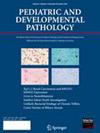Practical Approach to Congenital Anomalies of the Kidneys: Focus on Anomalies With Insufficient or Abnormal Nephron Development: Renal Dysplasia, Renal Hypoplasia, and Renal Tubular Dysgenesis
IF 1.3
4区 医学
Q3 PATHOLOGY
引用次数: 0
Abstract
Congenital anomalies of the kidney and urinary tract (CAKUT) accounts for up to 30% of antenatal congenital anomalies and is the main cause of kidney failure in children worldwide. This review focuses on practical approaches to CAKUT, particularly those with insufficient or abnormal nephron development, such as renal dysplasia, renal hypoplasia, and renal tubular dysgenesis. The review provides insights into the histological features, pathogenesis, mechanisms, etiologies, antenatal and postnatal presentation, management, and prognosis of these anomalies. Differential diagnoses are discussed as several syndromes may include CAKUT as a phenotypic component and renal dysplasia may occur in some ciliopathies, tumor predisposition syndromes, and inborn errors of metabolism. Diagnosis and genetic counseling for CAKUT are challenging, due to the extensive variability in presentation, genetic and phenotypic heterogeneity, and difficulties to assess postnatal lung and renal function on prenatal imaging. The review highlights the importance of perinatal autopsy and pathological findings in surgical specimens to establish the diagnosis and prognosis of CAKUT. The indications and the type of genetic testing are discussed. The aim is to provide essential insights into the practical approaches, diagnostic processes, and genetic considerations offering valuable guidance for pediatric and perinatal pathologists.先天性肾脏异常的实用方法:聚焦肾小球发育不全或异常的畸形:肾发育不良、肾发育不全和肾小管发育不良
先天性肾脏和泌尿道畸形(CAKUT)占产前先天性畸形的 30%,是全球儿童肾衰竭的主要原因。本综述重点介绍了治疗肾脏和泌尿道畸形的实用方法,尤其是那些肾小球发育不全或异常的病例,如肾发育不良、肾发育不全和肾小管发育不良。综述深入探讨了这些异常的组织学特征、发病机制、机制、病因、产前和产后表现、管理和预后。由于有几种综合征可能将 CAKUT 作为表型成分,而且肾发育不良可能发生在某些纤毛虫病、肿瘤易感综合征和先天性代谢错误中,因此对鉴别诊断进行了讨论。CAKUT 的诊断和遗传咨询具有挑战性,这是因为其表现形式、遗传和表型异质性存在很大差异,而且很难通过产前成像评估产后肺和肾功能。综述强调了围产期尸检和手术标本病理结果对确定 CAKUT 诊断和预后的重要性。还讨论了基因检测的适应症和类型。目的是为儿科和围产期病理学家提供有关实用方法、诊断过程和遗传因素的重要见解,为他们提供有价值的指导。
本文章由计算机程序翻译,如有差异,请以英文原文为准。
求助全文
约1分钟内获得全文
求助全文
来源期刊
CiteScore
3.70
自引率
5.30%
发文量
59
审稿时长
6-12 weeks
期刊介绍:
The Journal covers the spectrum of disorders of early development (including embryology, placentology, and teratology), gestational and perinatal diseases, and all diseases of childhood. Studies may be in any field of experimental, anatomic, or clinical pathology, including molecular pathology. Case reports are published only if they provide new insights into disease mechanisms or new information.

 求助内容:
求助内容: 应助结果提醒方式:
应助结果提醒方式:


